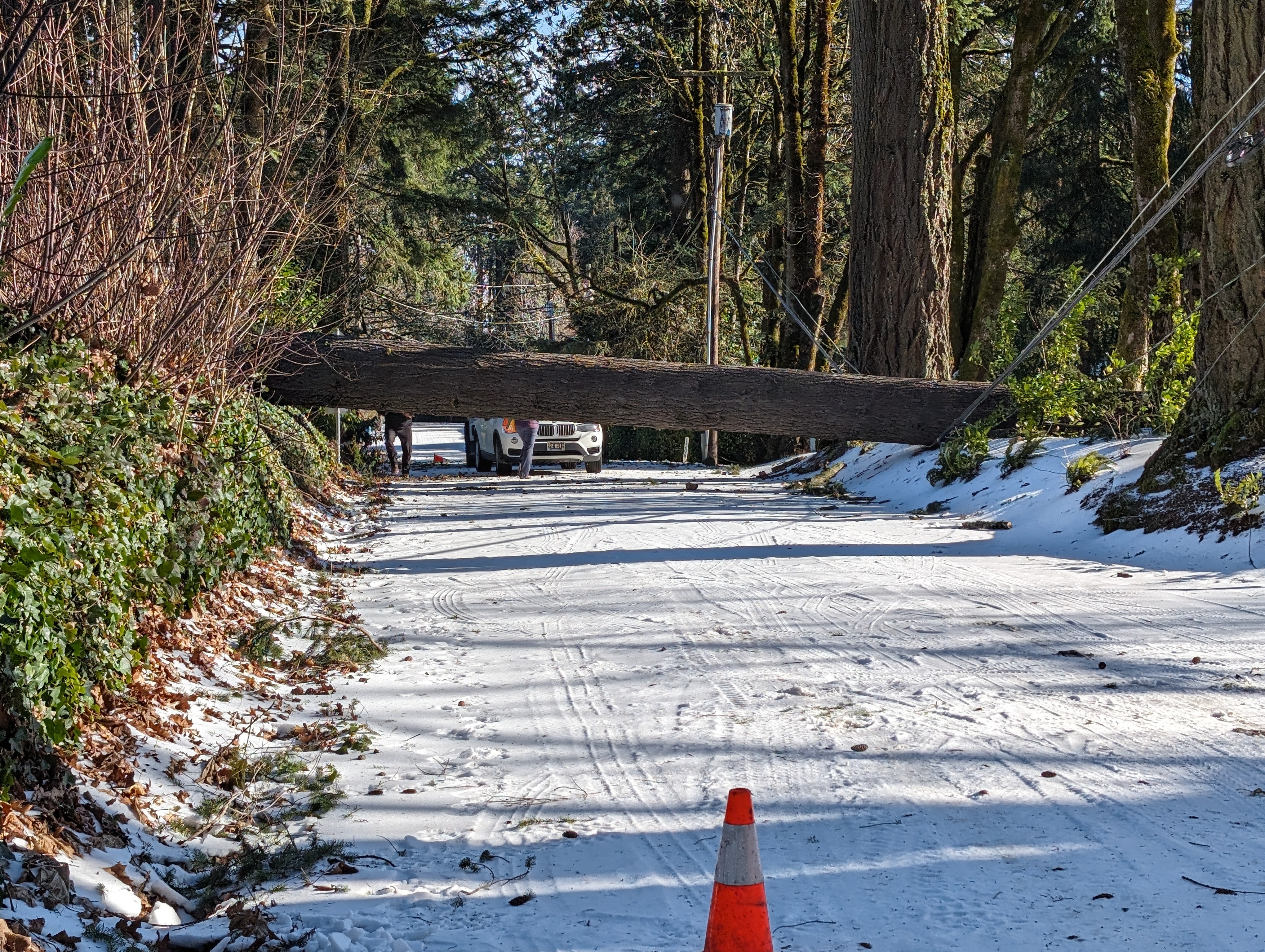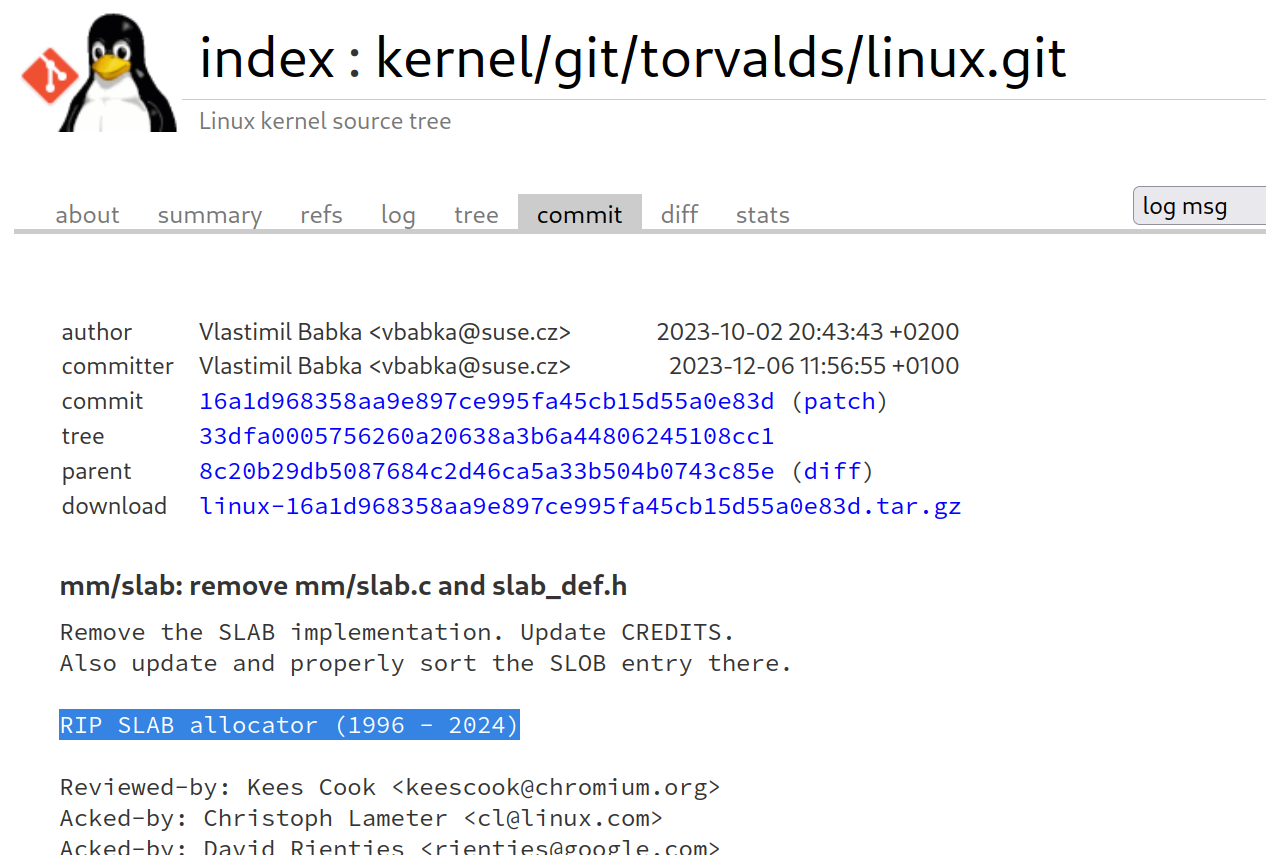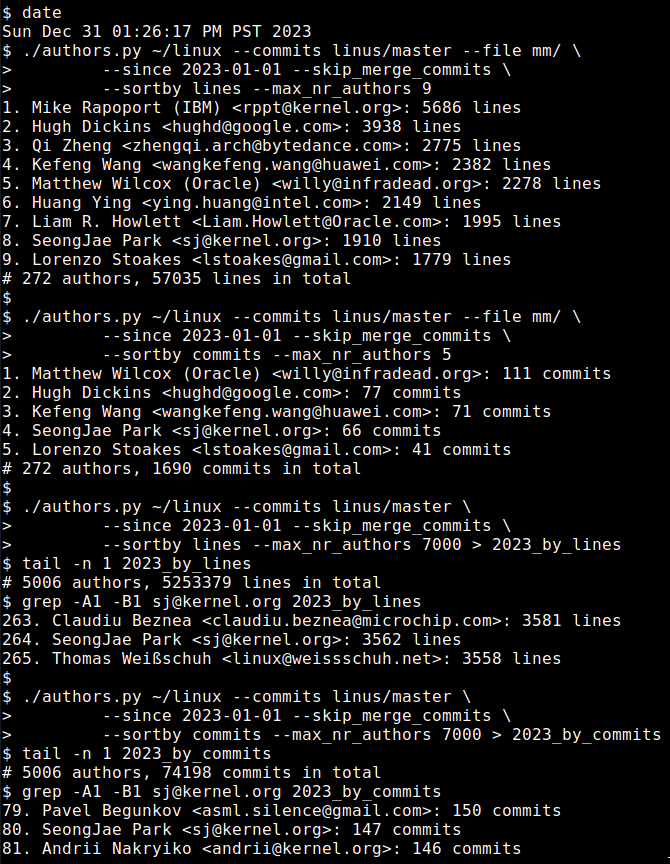Posts
249Following
42Followers
125LWN.net is now @LWN@lwn.net
LWN@fosstodon.org[$] The hard life of a virtual-filesystem developer https://lwn.net/Articles/960088/ #LWN
sj
sjhttps://social.kernel.org/notice/AeRckekHQlmmCAohFY
#linux #kernel #damon
LWN.net is now @LWN@lwn.net
LWN@fosstodon.org[$] The things nobody wants to pay for https://lwn.net/Articles/959069/ #LWN
Kees Cook (old account)
kees@fosstodon.orgAfter 4 years the strlcpy() API has been fully removed from the Linux kernel. Long live strscpy().
https://git.kernel.org/pub/scm/linux/kernel/git/torvalds/linux.git/commit/?id=d26270061ae66b915138af7cd73ca6f8b85e6b44
Next up, strncpy()!
https://github.com/KSPP/linux/issues/90
Linus Torvalds
torvaldsStaycation: day five.
Power still off, but outside is warming up. So now it’s a big ice rink outside with people playing bumper cars with the real things.
Not interested in partaking in that particular contact sport, and as a result I’m still not leaving the house even if the worry about frozen pipes is fading.
Instead trying to see how far I can get on the remaining merge window pulls on just battery power. Not very far I bet, but at least something.
PGE claims power back tonight. Of course, they did that yesterday too…
sj
sjSK Hynix shared[1] their DAMOS-based tiered memory management test results, with patches for that. To quote,
“DAMON 2-tier” memory management reduces the performance slowdown compared to the “default” memory policy from 15~17% to 4~5% when the system runs with high memory pressure on its fast tier DRAM nodes.
[1] https://lore.kernel.org/damon/20240115045253.1775-1-honggyu.kim@sk.com/
and following in the footsteps of SLAB, deprecate z3fold."
Well well, look who's a trendsetter now!
https://lore.kernel.org/all/20240112193103.3798287-1-yosryahmed@google.com/
Linus Torvalds
torvaldsPGE (Portland General Electric) claims we should get power back by 10pm today, but the ice storm arrives today, so we'll see.
Edit: well, it looks like PGE fixed the outage by just removing me from the outage database, not by actually reconnecting power. That was the second time that happened, so I re-re-reported the outage. Not that I was hugely optimistic about the 10pm timeframe, but it looks even less likely now.
sj
sj[1] https://lwn.net/Articles/957188/
[2] https://git.kernel.org/pub/scm/linux/kernel/git/torvalds/linux.git/commit/?id=9294a037c015
#linux #kernel #damon
Greg K-H
gregkhIt's been a good 6 years, and it was a solid kernel version for its time, but anyone still using it should have moved off it a long time ago as it has been showing its age for quite a while.
Thorsten Leemhuis (acct. 1/4)
kernellogger@fosstodon.orgWith https://git.kernel.org/torvalds/c/d30e51aa7b1f6fa7dd78d4598d1e4c047fcc3fb9 #SLAB is now gone from the #Linux #kernel. SLUB thus is now the one and only, as SLOB was removed a few moons ago already. Congrats to @vbabka for these successful shrinking efforts!
The merge commit linked above also brought "SLUB: delayed freezing of CPU partial slabs", which can improve the performance in certain benchmarks. #LinuxKernel
sj
sj```
- DAMON/DAMOS feature and maintenance work from SeongJae Park in
the series
"mm/damon: let users feed and tame/auto-tune DAMOS"
"selftests/damon: add Python-written DAMON functionality tests"
"mm/damon: misc updates for 6.8"
```
It also has many more interesting changes!
[1] https://lore.kernel.org/linux-mm/20240108155039.fd2798712a2a93a108b710ce@linux-foundation.org/
#linux #kernel #damon
(you have been warned)
https://lore.kernel.org/all/a0511a72-711b-4c8f-b9d7-da95681000c1@suse.cz/
sj
sjFor the Linux kernel whole tree, the numbers become 264th (3,562 lines) and 80th (147 commits) among 5,006 people.
For more details: https://sjp38.github.io/post/my_opensource_commits_stat_2023/
#linux #kernel #commits #statistics #2023
sj
sjTo quote the conclusion,
"""
DAMON community delivered multiple important features and a significant amount
of changes to the world via the collaboration between the 24 great
contributors. I would call 2023 as yet another successful and grateful years
of DAMON development.
Huge thanks to you again, DAMON community. Looking forward to continuing our
journey in 2024.
Hope you all enjoy the remaining holidays and a happy new year!
"""
#linux #kernel #damon
sj
sjhttps://github.com/skhynix/hmsdk/releases/tag/hmsdk-v2.0
#linux #kernel #damon
sj
sjRE: https://social.kernel.org/objects/a58dbb3c-21f5-47fe-a08d-55e918830fe7
Thorsten Leemhuis (acct. 1/4)
kernellogger@fosstodon.orgThis talk from Sasha covers some of the factors that contribute to the difficulty of maintaining stable #Linux #kernel, and explains how those factors increase in difficulty and complexity as the stable kernel gets older. The talk also offer suggestions to reduce the long-term burden, as well as cover best practices around patch backport and reduction of technical debt on these longer-term #LinuxKernel.[1]
https://www.youtube.com/watch?v=m3Wiujcxc4k
[1] text based on this abstract: https://ossjapan2023.sched.com/event/1Tyom/challenges-around-long-term-kernel-maintenance-sasha-levin-google?iframe=no&w=100%&sidebar=yes&bg=no
Christian Brauner 🦊🐺
brauner@mastodon.socialHey #Linux #Kernel people. Last year we had the first #Kernel Devroom at #FOSDEM. And we're running the #Kernel Devroom for #FOSDEM in 2024 as well!
#FOSDEM 2024 is taking place over the weekend of the 3 & 4 February in Brussels, Belgium!
It is a wonderful event that's very close to my and a lot of people's hearts!
Join @rppt, Daniel Borkmann, and @stgraber, and myself and make this another great #FOSDEM!
We're very excited for your submissions!
https://lists.fosdem.org/pipermail/fosdem/2023q4/003536.html



